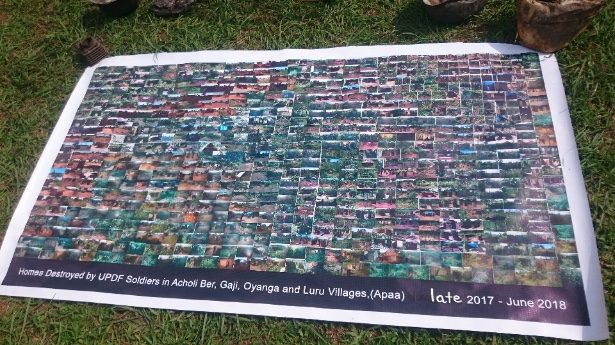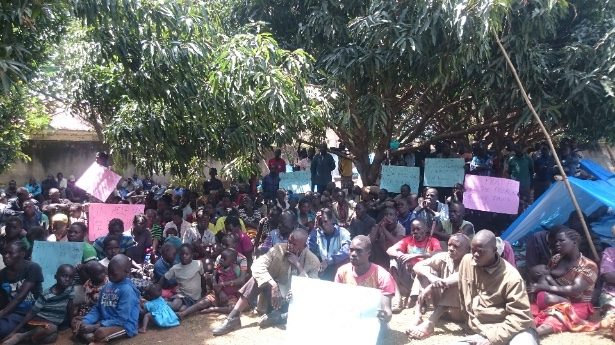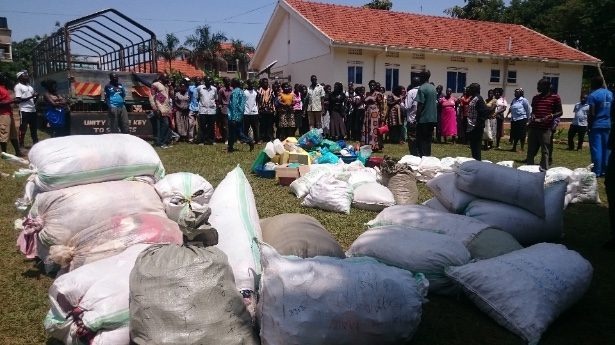After 37 days of occupying a United Nations office in Gulu, Uganda, 234 farmers, youth, mothers with young babies and elderly men packed their gear into trucks and returned to their homes in Apaa — an area of rich farmland and forest in the north of the country. Far from being a quiet and somber event, their departure was marked by an explosion of song and ululation. It was part collective exhale — following a month of cramped conditions, an overflowing pit latrine and daily hostilities from their reluctant “hosts” — and part cry of triumph and hope.
The occupiers from Apaa had uprooted themselves and thrust their community upon the only global stage accessible to them. They strategically chose the only office in the entire country that could be occupied without immediate forceful eviction. By the sustained, pure inconvenience of their presence, they forced the United Nations and other actors to address their struggle for land and security in a country that has inflicted great violence on them.
The long struggle for land and rights in Apaa
The occupiers began their trek from Apaa to Gulu on July 10, a journey that took over 20 hours on foot and by truck, due to bad roads and mechanical breakdowns. They arrived, silently, at 7 a.m. outside the U.N. Office of the High Commissioner for Human Rights, or OHCHR, with a petition on behalf of over 26,000 Apaa residents. The petition requested that the high commissioner in Geneva call on Uganda’s government to halt the arsons, killings, arrests and other abuses perpetrated against their community.
Such violence has been inflicted on the people of Apaa for almost a decade, as political elites have used state armed forces to attempt to drive residents from their land and clear the way for foreign investment. While one plan — to develop the area into a high-end trophy hunting park — was abandoned in 2015, locals believe that elites continue to pursue other deals.
The decision to occupy the OHCHR was not made lightly. It came after residents in Apaa tried many other methods to protect their homes. Following a new wave of attacks in March, they lobbied their representatives to raise the issue in parliament, guided researchers from local human rights groups to meticulously document recent abuses, requested meetings with foreign embassies, attended court hearings, and intercepted soldiers who perpetrated attacks with an envoy of local religious and political leaders.
Despite momentary victories, none of these efforts yielded long lasting results. Foreign embassies expressed sympathy, but didn’t respond to requests to meet. In a June parliament session, the deputy speaker called for an immediate halt on eviction operations. But attacks resumed just 15 days later. That’s when a core group of local leaders from affected areas decided on a new strategy: occupy the U.N. OHCHR, a body mandated to “promote and protect human rights for all,” as well as “speak out objectively in the face of human rights violations worldwide.”
According to a community leader of women in Apaa, who asked not to be named for security reasons, “We decided to occupy the United Nations to ensure that our struggle in Apaa would come to light, and become known internationally.”
The petition they drafted called on High Commissioner Prince Zeid Ra’ad Al Hussein to demand that Ugandan President Yoweri Museveni put an immediate halt to all attacks on homes and people in Apaa. In the event that the government failed to engage with these requests, the petitioners asked that the high commissioner call on foreign embassies to withhold funding to state security forces and the Ugandan Wildlife Authority. Making it clear that they wouldn’t leave without results, the petitioners emphasized, “We will seek refuge and assistance here till our pleas are met.”
Protecting the United Nations instead of human rights
In the first hours after the occupiers entered the U.N. gates, U.N. office assistants hovered anxiously on their phones, consulting their superiors in the capital Kampala. Security personnel stood rigid and agitated. The 234 occupiers from Apaa sat silently on the grass, heads bowed in prayer, waiting to see if police would be summoned to forcibly evict them. The word finally came from Kampala: They would not be expelled. The fact of the occupation was reluctantly accepted. The occupiers then began erecting tarpaulins to establish the camp and set up an outdoor kitchen with huge cooking pots propped up on rocks. The surprised U.N. staff rushed back to Gulu from meetings in the capital to the unprecedented scene awaiting them in their usually sleepy office.

It quickly became clear to the occupiers why the OHCHR refused to engage with their petition, or to publicly condemn attacks in Apaa. Operating on a “terminal mandate” from the Ugandan government that is due to expire in early January, the OHCHR feared it could be forced to leave the country if it caused too much agitation. In endless meetings, the United Nations tried in vain to explain to community leaders, local members of parliament and local human rights organizations that making public statements about abuses in Apaa could comprise its very existence in the country. Unsurprisingly, the occupiers saw this as weak, self-interested logic. Numerous local civil society groups began to question the very purpose and validity of the OHCHR’s work in Uganda.
According to several occupiers, the OHCHR then began to make life difficult for them in the compound. Free press and freedom of expression were suppressed. All media were blocked from entering the compound to speak with the occupiers, and when they organized their own press conference outside the U.N. walls, they were not permitted to leave to attend it. A member of the occupation who took photos with his cell phone reported that he was threatened with arrest if he continued to “leak” photos to media outside the U.N. walls. His phone was confiscated until he agreed not to take photos. Occupiers explained that meetings within the camp were monitored, and movements in and out of the compound were heavily restricted.
According to another Apaa community leader, who also asked not to be named, “the United Nations tried to block us from talking to the media because they were so concerned with their own image. They also wanted to keep their relationship with the government comfortable.”

To make matters worse, when the U.N. compound’s single pit latrine became full, staff refused to let concerned local NGOs have it drained. For four days, Apaa residents squatted over a pit close to over-flowing, swarming with maggots. It eventually took the intervention of a member of parliament to convince the OHCHR to allow a sanitation truck to enter and empty the contents of the latrine.
Almost every day, the OHCHR staff in Gulu, Kampala and, eventually, even Geneva were forced into a dilemma: Without the option of neutrality, would they stand with and support those suffering human rights abuses on their doorstep, or would they act to protect their comfortable jobs?
Local solidarity boosts occupiers’ morale
Some of the most beautiful moments of the occupation were displays of solidarity from surprising and far-flung locations. Since the United Nations wouldn’t provide any practical support for the occupiers, they had to turn to others for help when their supplies began to run low. In the first week, hundreds of local market vendors arrived in a giant truck, packed with huge sacks of cassava, millet flour, beans, huge cans of cooking oil, sacks of clothes and blankets, and pots and basins. While a range of local groups in Gulu contributed practical support to the occupation, community and activist groups in other parts of Uganda delivered bags of peanuts, chickens, firewood, soap and food staples. Members of parliament organized for trucks to deliver water when the national water supply dried up, and local NGOs were at the ready to top off food supplies.

Beyond practical support, many groups spoke out, tipping the balance of public opinion in favor of the occupiers and their brave action to defend their community’s rights. The National Land Defense League held a press conference in Kampala in solidarity, giving the prime spot to representatives from Apaa. An alliance of prominent human rights groups and activists in Gulu came out in support of the occupation, pledging to help them for “as long as they decided to stay” and to escort them home when they decided to leave.
Traditional advocacy gains new power
Doors that had previously been closed to the community, when they were out of sight in Apaa, suddenly opened after the occupiers seized center stage in Gulu. In the fourth week of the occupation, four community representatives and a baby sneaked out of the U.N. compound and took a bus to Kampala to attend a series of meetings. After presenting their testimonies to the deputy speaker of parliament, along with eight Acholi district chairmen, the group opened a case in the Ugandan Land Inquiry Commission. They met with the U.S. ambassador, the E.U. ambassador, representatives from the embassies of Norway and Denmark, and — finally — Nicole Bjerler, the head of the OHCHR Uganda office, who was accompanied by Alan Sibenaler, the acting head of all U.N. programs in Uganda.
With the leverage generated by the occupation, the Apaa community’s traditional advocacy meetings gained real power. The occupation forced embassies to grasp human rights abuses in Apaa as concrete and urgent, rather than remote and abstract. Both the U.S. ambassador and the E.U. ambassador engaged deeply in the details of the Apaa case, saying they would discuss Apaa in their upcoming meetings with President Museveni. Meanwhile, the deputy speaker had already met with the president and reported back to the district chairpersons that he had issued a directive against eviction operations in Apaa.
Despite constant pressure from U.N. staff to pack up and leave, the occupiers had — by this point — sustained their presence for almost a month. In a three-hour, translated meeting in Kampala, Bjerler emphasized that their diplomacy efforts had yielded fruit: the Ugandan Army assured them they would follow the directive against evictions in Apaa.
Meanwhile, Sibenaler offered a more unexpected, startling concession, that even surprised other U.N. staff: health and education programs in Apaa. When the Apaa representatives reported back to their community waiting in Gulu, this news was met with triumph. In the words of one Apaa community leader, “If they are serious about education support, they will build a school, as ours have been burned down. And building a school would show the world they are defending Apaa as our land, not a game reserve. Animals don’t need schools.”
The decision to pack up and return home
After their envoy returned from Kampala, community leaders of the occupation held a strategy meeting in their camp. While the team decided that the assurances they received were strong enough to end their protest, the occupiers are far from naïve about their decision to return home. As one of the occupiers reflected, “Our fight is not complete. But we have achieved a lot, and we now have powerful allies. We hope our struggle will give others across Uganda the courage to organize for their rights.”
By surprising the United Nations, the Ugandan government and even their own local politicians, the community of Apaa has shown the world they are not passive victims, but powerful agents of change. Ground has been won, and power has been built. The ongoing struggle of the Apaa community and their right to live in peace on their own land is not over, but it will never be the same again.

Inspiring stuff again from Phil Wilmot. Will this tactic be replicated elsewhere I wonder? Direct action to put pressure on the UN seems more effective than wading through their bureaucracy.
Inspiring uprising for real democracy. Thanks for awakening me to the struggle by people in Apaa. I will follow this as closely as I can, as we must back their continued efforts to make these victories real.